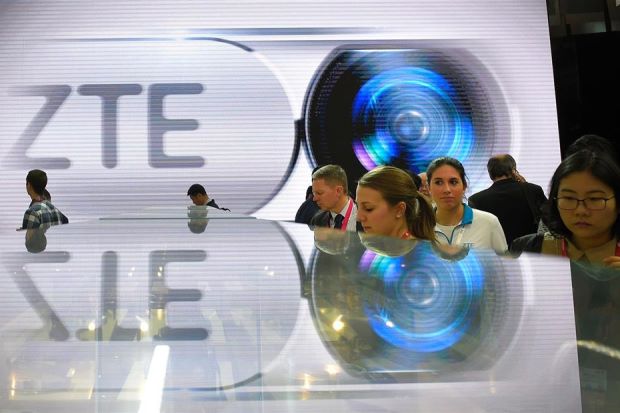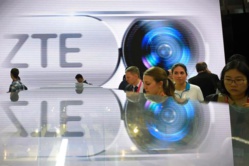As per a senior official from the Department of Commerce, the U.S. government plans on proving ZTE Corp with temporary relief measures, lifting the export curbs it had placed earlier for violating Iran specific sanctions.
Sanctions placed earlier by the U.S. government on ZTE made it difficult for the Chinese company to acquire U.S. made components since it required that its suppliers apply for an export license before including any U.S. made components in products its products, which are generally denied.
According to a senior official from the agency, ZTE has been indulging “in active, constructive discussions” with the U.S. Commerce Department for the past one week.
“As part of the effort to resolve the matter, and based upon binding commitments that ZTE has made to the U.S. government, Commerce expects this week to be able to provide temporary relief from some licensing requirements,” said the official.
The official went on to add, "The relief would be temporary in nature and would be maintained only if ZTE is abiding by its commitments to the U.S. Government,"
The details of the commitments are scheduled to be published later this week in the U.S. Federal Register.
On its part, ZTE has disclosed that it will ensure that all of its operational activities comply with international standards of its host countries. Since this is a process and not a time solution, it will continue to communicate and resolve all outstanding matters with relevant parties.
Export Curb
As per available public records, amongst the large companies hit by the U.S. Commerce Department with its near-total export cub, ZTE is one of the largest to have been hit by the ban. The export ban has hit its business hard and drew protest from the Chinese Government.
According to research firm IDC, ZTE is the 4th largest smartphone vendor in the U.S., having a market share of 7%. It lags behind its competitors such as Apple, Samsung Electronics Co and LG Electronics. Its smartphones are sold to three of the four giant telecom operators in the U.S., including, Sprint, AT&T, and T-Mobile.
For the last two weeks ZTE has delayed the publication of its annual results saying it is studying the impact of the export ban. Similarly, for this period, its shares weren’t traded on the Hong Kong stock exchange. Prior to a suspension of trading, its shares closed at KH $14.16. ZTA has said it will postpone its annual board meeting.
Ever since it started drawing fire, in 2012, for its export dealings with Iran, that went counter to U.S. led sanctions, it has stepped up lobbying efforts in Washington. Earlier reports have linked ZTE to the Chinese government and to the country’s military establishment.
As per lobbying records maintained by the U.S. Congress, in 2011, ZTE had spent $212,000. It has spent $5.1 million in the last four years to assuage U.S national security concerns raised by lawmakers.
All of these activities and concern come in the wake of news reports from Reuters which stated that millions of dollars worth of U.S. goods, hardware and software, were shipped to Iran’s largest telecom provider.
Sanctions placed earlier by the U.S. government on ZTE made it difficult for the Chinese company to acquire U.S. made components since it required that its suppliers apply for an export license before including any U.S. made components in products its products, which are generally denied.
According to a senior official from the agency, ZTE has been indulging “in active, constructive discussions” with the U.S. Commerce Department for the past one week.
“As part of the effort to resolve the matter, and based upon binding commitments that ZTE has made to the U.S. government, Commerce expects this week to be able to provide temporary relief from some licensing requirements,” said the official.
The official went on to add, "The relief would be temporary in nature and would be maintained only if ZTE is abiding by its commitments to the U.S. Government,"
The details of the commitments are scheduled to be published later this week in the U.S. Federal Register.
On its part, ZTE has disclosed that it will ensure that all of its operational activities comply with international standards of its host countries. Since this is a process and not a time solution, it will continue to communicate and resolve all outstanding matters with relevant parties.
Export Curb
As per available public records, amongst the large companies hit by the U.S. Commerce Department with its near-total export cub, ZTE is one of the largest to have been hit by the ban. The export ban has hit its business hard and drew protest from the Chinese Government.
According to research firm IDC, ZTE is the 4th largest smartphone vendor in the U.S., having a market share of 7%. It lags behind its competitors such as Apple, Samsung Electronics Co and LG Electronics. Its smartphones are sold to three of the four giant telecom operators in the U.S., including, Sprint, AT&T, and T-Mobile.
For the last two weeks ZTE has delayed the publication of its annual results saying it is studying the impact of the export ban. Similarly, for this period, its shares weren’t traded on the Hong Kong stock exchange. Prior to a suspension of trading, its shares closed at KH $14.16. ZTA has said it will postpone its annual board meeting.
Ever since it started drawing fire, in 2012, for its export dealings with Iran, that went counter to U.S. led sanctions, it has stepped up lobbying efforts in Washington. Earlier reports have linked ZTE to the Chinese government and to the country’s military establishment.
As per lobbying records maintained by the U.S. Congress, in 2011, ZTE had spent $212,000. It has spent $5.1 million in the last four years to assuage U.S national security concerns raised by lawmakers.
All of these activities and concern come in the wake of news reports from Reuters which stated that millions of dollars worth of U.S. goods, hardware and software, were shipped to Iran’s largest telecom provider.















